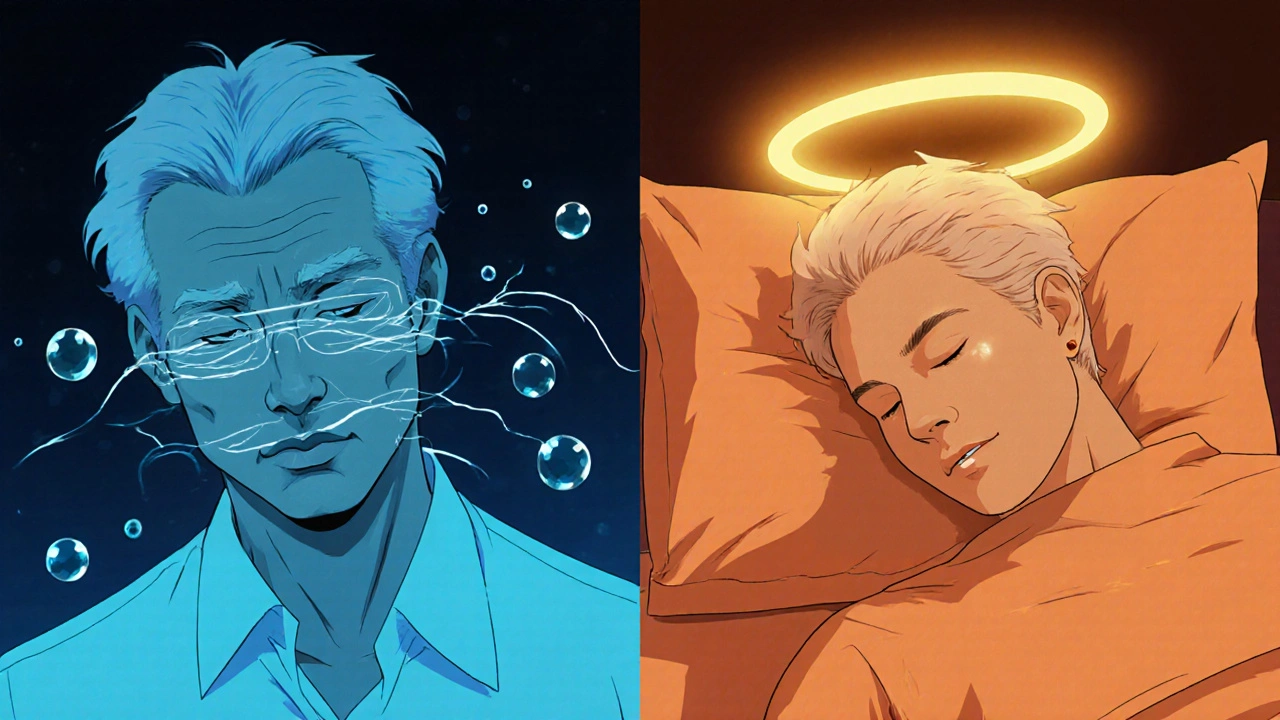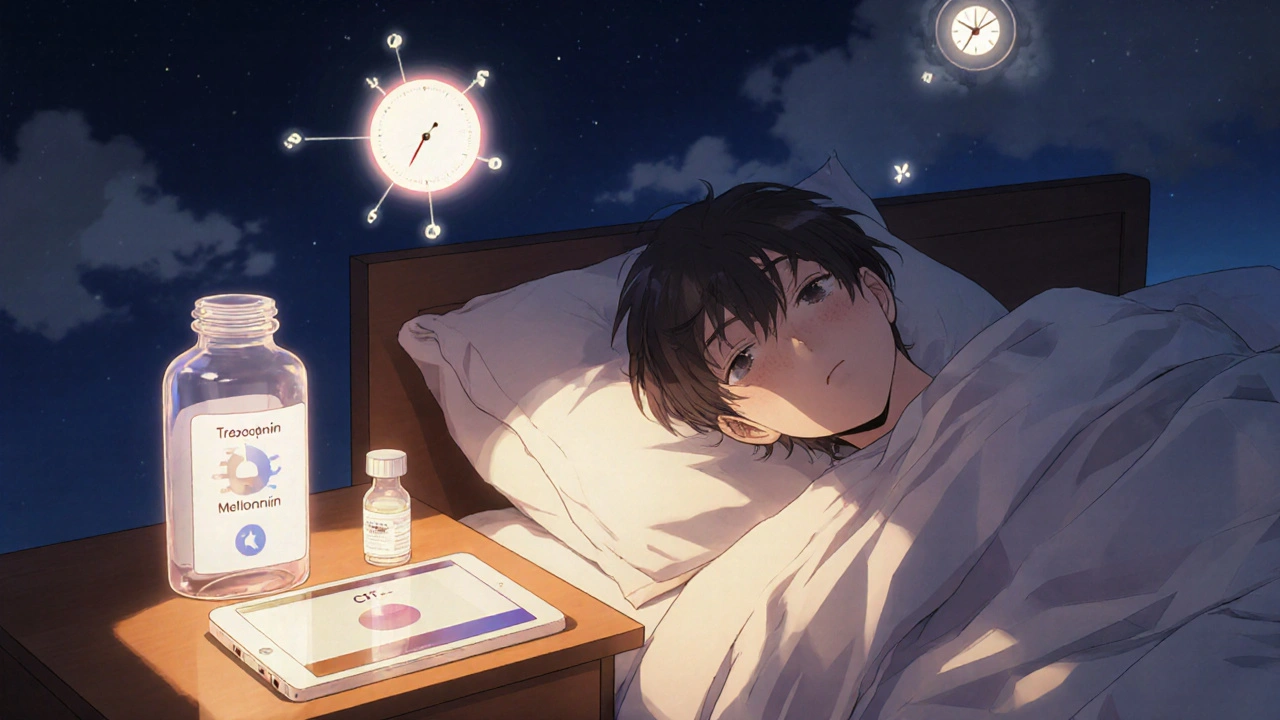If you’re taking Desyrel (trazodone) for sleep or depression, you’re not alone. Thousands of people in Canada and the U.S. use it every day - often because other medications didn’t work, or caused too many side effects. But maybe you’re wondering: is there something better? Or cheaper? Or safer? This isn’t about switching just for the sake of it. It’s about finding the right fit for your body, your lifestyle, and your goals.
What Desyrel (Trazodone) Actually Does
Desyrel is the brand name for trazodone. It’s an antidepressant, but it’s rarely used today for major depression alone. Most doctors prescribe it off-label for insomnia - especially when anxiety or depression is also present. It works by boosting serotonin in the brain, which helps calm racing thoughts and makes falling asleep easier.
Unlike benzodiazepines like Xanax or sleep pills like zolpidem (Ambien), trazodone isn’t addictive. That’s why it’s a go-to for long-term use. But it’s not perfect. Many people report next-day drowsiness, dizziness, dry mouth, or a weird taste in their mouth. Some notice low blood pressure, especially when standing up fast. For older adults, these side effects can be risky.
Studies show trazodone helps people fall asleep faster - about 10 to 20 minutes quicker on average. But it doesn’t always help you stay asleep. And if you’re using it for depression, it can take 2 to 6 weeks to feel the full effect.
Alternative 1: Doxepin (Silenor)
Doxepin is another antidepressant, but at low doses (3 mg or 6 mg), it’s FDA-approved just for sleep - specifically for trouble staying asleep. Unlike trazodone, it doesn’t cause much next-day grogginess in most people. It’s also gentler on blood pressure.
One 2023 study in the Journal of Clinical Sleep Medicine found that doxepin improved sleep maintenance better than trazodone over 4 weeks, with fewer reports of dizziness. It’s not as strong for depression, though. If your main problem is waking up at 3 a.m. and can’t fall back asleep, doxepin might be a better fit.
Downside? It can cause weight gain and dry mouth. And it’s not always covered by insurance because it’s often prescribed off-label at low doses.
Alternative 2: Mirtazapine (Remeron)
Mirtazapine is a different kind of antidepressant that also makes you sleepy - often so much so that doctors prescribe it for sleep even if depression isn’t the main issue. It works differently than trazodone, blocking certain receptors in the brain that keep you alert.
People who’ve tried both say mirtazapine helps them sleep deeper and longer. One patient in Toronto reported sleeping 7 hours straight for the first time in years after switching from trazodone to 7.5 mg of mirtazapine. But it comes with trade-offs: increased appetite and weight gain are common. Some gain 10 to 15 pounds in a few months.
It’s also more effective than trazodone for treating depression, especially in people with low energy and poor appetite. If you’re struggling with both sleep and mood, mirtazapine could do double duty.

Alternative 3: Trazodone vs. Melatonin and Ramelteon
For people who want to avoid antidepressants entirely, melatonin is the most popular over-the-counter option. It’s safe, cheap, and works well for jet lag or circadian rhythm issues. But for chronic insomnia? The evidence is weak. Most studies show it only helps people fall asleep 5 to 10 minutes faster - not enough for many.
Ramelteon (Rozerem) is a prescription melatonin receptor agonist. It targets the brain’s sleep-wake clock directly. It’s not addictive, doesn’t cause next-day drowsiness, and is approved for sleep onset insomnia. But it won’t help if you wake up in the middle of the night. And it’s expensive - often over $100 a month without insurance.
If you’ve tried trazodone and just want something gentler, ramelteon is worth asking about. But don’t expect miracles if your sleep issues are tied to anxiety or stress.
Alternative 4: SSRIs and SNRIs - Are They Better?
Many people start with SSRIs like sertraline (Zoloft) or escitalopram (Lexapro) for depression. But here’s the catch: these drugs often make insomnia worse - especially at first. That’s why doctors sometimes add trazodone on top.
Some SNRIs, like venlafaxine (Effexor), can also disrupt sleep. But others, like duloxetine (Cymbalta), have a more neutral effect. If you’re on an SSRI and still can’t sleep, adding trazodone is common. But if you’re looking to replace trazodone entirely, switching to a different antidepressant might not help unless you’re also dealing with significant anxiety or low mood.
One exception: bupropion (Wellbutrin). It’s an antidepressant that doesn’t cause drowsiness - and might even help you sleep better by reducing nighttime anxiety. But it’s not for everyone. People with seizure disorders or eating disorders should avoid it. And it can cause jitteriness or trouble falling asleep in some.
Alternative 5: Cognitive Behavioral Therapy for Insomnia (CBT-I)
Here’s the truth most doctors won’t tell you: medication doesn’t fix the root cause of insomnia. It masks it. If you’re lying awake because your mind won’t shut off, or you’re stressed about not sleeping, no pill will fix that long-term.
Cognitive Behavioral Therapy for Insomnia (CBT-I) is the gold standard. It’s not therapy in the talk-heavy sense. It’s a structured 6- to 8-week program that teaches you how to retrain your brain and body to sleep. Studies show it works better than any sleep medication - and the effects last years after stopping.
One 2024 meta-analysis in JAMA Psychiatry found CBT-I improved sleep quality in 70% of participants, compared to 50% for trazodone. And there were no side effects. The problem? It’s hard to find a certified CBT-I therapist. Many insurance plans don’t cover it. Online programs like Sleepio or CBT-I Coach are more accessible and cost under $50 a month.

How to Decide What’s Right for You
There’s no one-size-fits-all. Your choice depends on what you’re trying to fix.
- If your main issue is waking up too early → Try doxepin.
- If you have depression + poor appetite + low energy → Try mirtazapine.
- If you want to avoid antidepressants entirely → Try ramelteon or CBT-I.
- If you’re on an SSRI and still can’t sleep → Stick with trazodone for now, but ask about CBT-I.
- If you’re over 65 → Be extra cautious with trazodone. Doxepin or CBT-I are safer.
Also consider cost. Trazodone is generic and often under $5 a month. Mirtazapine and doxepin are also cheap. Ramelteon? Over $100. CBT-I programs? $30-$80/month, but often covered by extended health plans in Canada.
What Not to Do
Don’t stop trazodone cold turkey. Even though it’s not addictive, your body gets used to it. Suddenly stopping can cause rebound insomnia, anxiety, or even nausea. Always taper down slowly under a doctor’s supervision.
Don’t mix trazodone with alcohol, opioids, or benzodiazepines. The combo can slow your breathing to dangerous levels - especially if you’re older or have sleep apnea.
Don’t assume ‘natural’ means safer. Melatonin supplements aren’t regulated. Some contain way more than the label says. Others have contaminants. Stick to brands tested by third parties like USP or NSF.
Bottom Line
Trazodone works for many people - especially as a short-term fix. But it’s not the only option. For some, doxepin offers better sleep maintenance. For others, mirtazapine fixes both mood and sleep. And for those ready to go beyond pills, CBT-I delivers lasting results without side effects.
The best choice isn’t the one with the fewest side effects. It’s the one that matches your sleep problem, your health history, and your willingness to try non-drug solutions. Talk to your doctor - but come prepared with questions. Bring this list. Ask about CBT-I. Ask about alternatives. Your sleep is worth the conversation.
Is trazodone addictive?
No, trazodone is not addictive. It doesn’t cause physical dependence like benzodiazepines or sleep pills. But your body can get used to it, so stopping suddenly may cause rebound insomnia or mild withdrawal symptoms like nausea or anxiety. Always taper off slowly under medical supervision.
Can I take trazodone and melatonin together?
Yes, many people take trazodone and melatonin together safely. Trazodone helps calm your mind and induce sleep, while melatonin helps regulate your sleep-wake cycle. But since both can cause drowsiness, start with low doses. Avoid combining them with alcohol or other sedatives.
Which is better for sleep: trazodone or mirtazapine?
Mirtazapine often works better for deep, uninterrupted sleep and is more effective if you also have depression, low energy, or poor appetite. Trazodone is better if you just need help falling asleep and want to avoid weight gain. Mirtazapine tends to cause more weight gain, while trazodone causes more dizziness and dry mouth.
Does trazodone help with anxiety?
Yes, trazodone can help reduce anxiety, especially when it’s tied to depression or insomnia. It’s not a first-line anti-anxiety drug like SSRIs, but its calming effect on serotonin makes it useful for nighttime anxiety. Many people report feeling less restless and more relaxed after a few days of use.
How long does it take for trazodone to work for sleep?
For sleep, trazodone usually works the first night - you may feel drowsy within 30 to 60 minutes after taking it. But if you’re using it for depression, it can take 2 to 6 weeks to notice a real improvement in mood. Always give it at least 2 weeks before deciding if it’s working.
Is CBT-I really better than medication?
Yes, according to multiple studies, CBT-I is more effective than sleep medications like trazodone in the long term. It doesn’t just help you sleep better - it rewires how your brain responds to sleeplessness. The effects last for years after treatment ends. Medications work while you’re taking them, but symptoms often return after stopping.


kshitij pandey
October 30, 2025 AT 19:19Trazodone saved my life after years of insomnia. I tried everything from melatonin to Ambien, but nothing stuck. The drowsiness? Yeah, I get it. But waking up feeling human? Worth it. I’ve been on it for 3 years now, no dependence, no crashes. Just quiet nights and clearer days.
Scarlett Walker
October 31, 2025 AT 19:02I switched from trazodone to mirtazapine last year and honestly? My sleep went from fragmented to solid. I used to wake up at 2 a.m. and stare at the ceiling. Now I sleep through till 7. The weight gain? Real. I gained 12 lbs. But if you’re depressed and tired all the time, that trade-off makes sense. Talk to your doc about low-dose options.
Brian Bell
November 1, 2025 AT 09:10CBT-I is the real MVP. I did the Sleepio program for $40 and now I don’t need anything. No pills, no guilt, no weird taste in my mouth. Just better sleep habits. I know it sounds too good to be true but it works. Try it before you keep stacking meds.
Dilip Patel
November 2, 2025 AT 21:09Everyone here is acting like trazodone is some miracle drug. In India we’ve been using it for decades and it’s just another sedative. The side effects are worse than the problem. Doxepin? Who even heard of that? And CBT-I? Good luck finding a therapist who speaks Hindi. This whole post feels like American privilege wrapped in medical jargon.
Hrudananda Rath
November 4, 2025 AT 04:26It is, without a shadow of a doubt, an egregious oversight that this post does not reference the 2021 Cochrane Review on serotonergic agents and sleep architecture. Trazodone’s efficacy, while statistically significant in short-term trials, demonstrates no durable advantage over placebo beyond the fourth week of administration. Furthermore, the omission of any discussion regarding the pharmacokinetic variability of CYP3A4 metabolism in elderly populations constitutes a clinically irresponsible oversimplification. One must ask: is this content intended for the layperson, or for the perpetuation of pharmaceutical complacency?
Ashley Durance
November 5, 2025 AT 02:48People who say CBT-I is better are ignoring the fact that most of us can’t afford to spend 8 weeks trying to fix our brains when we’re barely surviving. Trazodone isn’t perfect, but it’s a Band-Aid that lets you function. Stop romanticizing therapy like it’s a moral victory. Not everyone has the luxury of being ‘wellness-minded’.
Scott Saleska
November 7, 2025 AT 00:09I’m curious - if someone is on an SSRI and still can’t sleep, why not just increase the SSRI dose instead of adding trazodone? I’ve seen patients do that and it works better long-term. Also, has anyone here tried low-dose naltrexone for sleep? It’s not FDA-approved for this, but I’ve read some fascinating case studies.
Nathan Hsu
November 7, 2025 AT 13:00Wait. I just want to say - melatonin isn’t regulated? That’s insane. I bought a bottle labeled ‘5mg’ and the lab report showed 12.7mg. And that’s not even the worst. Some brands have serotonin in them. That’s not a supplement - that’s a chemical gamble. Always check for USP. Always. Don’t be the person who ends up in the ER because they trusted a random Amazon review.